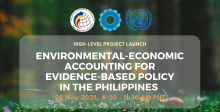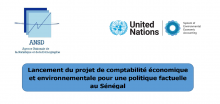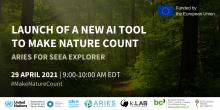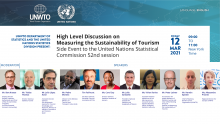The Inter-Agency and Expert Group (IAEG) on Disaster-related Statistics is set up as per the decision (50/116) of the UN Statistical Commission taken at its 50th Session in 2019. It is a formal mechanism under the purview of the UN Statistical Commission established with the primary objective to advance a common statistical framework on disaster-related statistics involving a network across the expert communities to sustain cooperation, coordination and fundraising for enhancing statistics related to hazardous events and disasters. The IAEG is currently co-chaired by ESCAP and UNDRR.
- Home
- Events
Events
Upcoming Events
The high-level launch of the project "Environmental-Economic Accounting for Evidence-Based Policy in the Philippines" is a collaborative effort between the Philippine Statistics Authority (PSA) and the United Nations Statistics Division (UNSD).
The high-level launch of the project "Environmental-Economic Accounting for Evidence-Based Policy in Senegal" which is a collaborative effort between the National Agency of Statistics and Demography of Senegal (ANSD) and the United Nations Statistics Division (UNSD).
The Statistics Division (SD) of the UN Department of Economic and Social Affairs (UN DESA) and the UN Environment Program (UNEP), in collaboration with the international research and innovation platform Artificial Intelligence for Environment & Sustainability (ARIES) at the Basque Centre for Climate Change (BC3), are launching a pioneering Artificial Intelligence (AI)-powered application for rapid natural capital accounting:
Description
The government of Sudan is addressing land, natural resources degradation and poverty, as reported in the National Quarter-Century Strategy (2007-2031) and the National Adaptation Program of Action (NAPA). The country is prioritizing the reconstruction and protection of forest ecosystems, raising the environmental awareness and development of the forest industry. The National Biodiversity Strategy and Adaptation Plan (NBSAP) (2011-2020) also addresses rehabilitation of degraded ecosystems.
Organized by the UN Statistical Institute for Asia and the Pacific (UNSIAP), this self-paced course introduces concepts relevant to compiling indicators that inform climate change. Topics inlcude: climate change policies and indicators; energy and air emission accounts as well as indicators that can be compiled from these SEEA accounts; data sources; and institutional mechanisms.
The course is open and free to all those interested as of 1 April 2021. Please visit siap-elearning.org to find out more.
The webinar is part of a series under the Africa Natural Capital Accounting Community of Practice organized in cooperation between UNSD and the World Bank Global Program on Sustainability, the Gaborone Declaration for Sustainability in Africa, the United Nations Economic Commission for Africa, the United Nations Environment Programme, the Green Growth Knowledge Platform, the Conservation International and the Capitals Coalition.
The World Tourism Organization (UNWTO) in collaboration with the United Nations Statistics Division (UNSD), is accompanying leading countries and institutions in the development of a Statistical Framework for Measuring the Sustainability of Tourism (SF-MST). Such a framework is as important as ever in the aftermath of the global health and economic crisis, as the tourism sector looks to restart in a more sustianable manner.
Events Calendar
| Sun | Mon | Tue | Wed | Thu | Fri | Sat |
|---|---|---|---|---|---|---|
|
|
|
1 |
2 |
3 |
4 |
5 |
|
6 |
7 |
8 |
9 |
10 |
11 |
12 |
|
13 |
14 |
15 |
16 |
17 |
18 |
19 |
|
20 |
21 |
22 |
23 |
24 |
25 |
26 |
|
27 |
28 |
29 |
30 |
31 |
|
|







